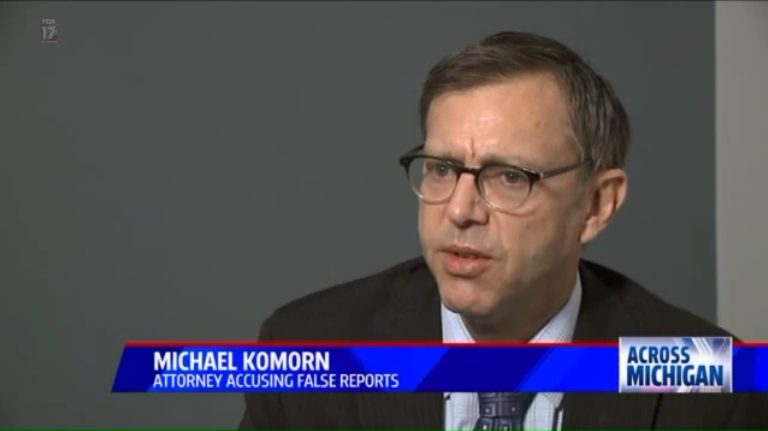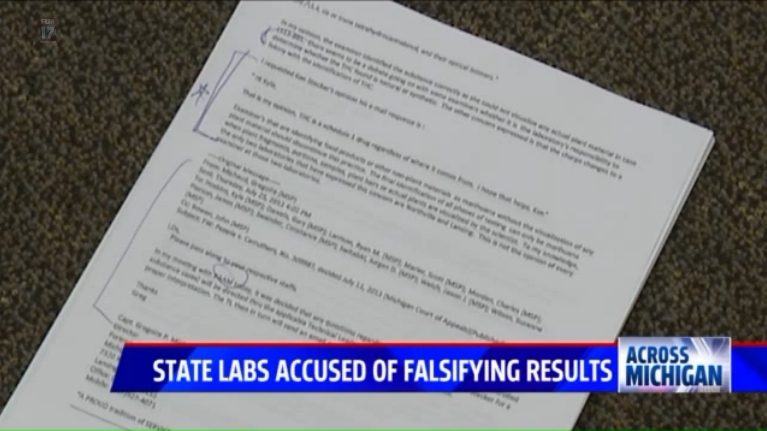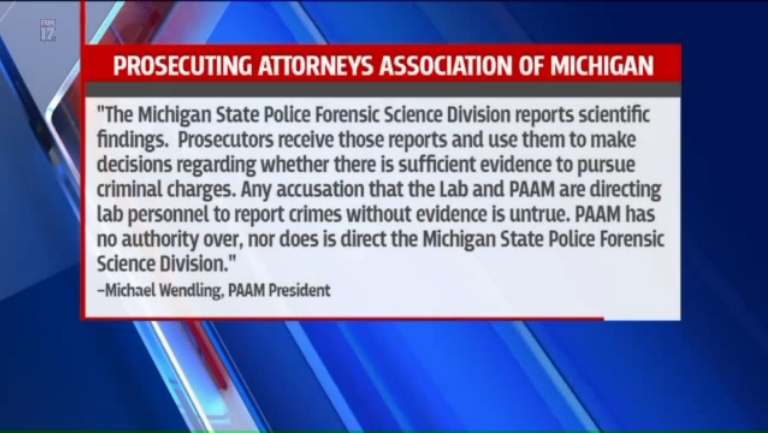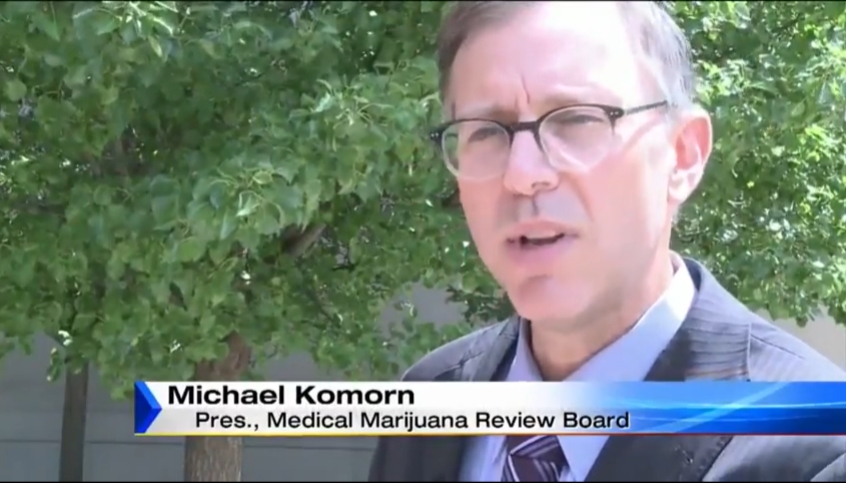
Nov 18, 2015 | Blog, Medical Marijuana Attorney Michael Komorn, Michigan Medical Marijuana Act, News
GRAND RAPIDS, Mich. – Big questions are still looming over the controversial Michigan State Police Forensic Science Division marijuana reporting policy change: it’s accused of ambiguous crime lab reporting leading to misdemeanor pot charges trumped for synthetic-THC felonies.
Tuesday MSP-FSD officials responded to FOX 17’s investigation: officials stated they stand by their policy change, but they failed to address some of our biggest questions.
Last month, FOX 17 was the first to show you emails accusing the crime labs of falsely reporting marijuana extracts, leading to trumped up felony charges of synthetic pot possession. Tuesday, state police officials released a seven-paragraph statement which explains their 2013 policy change to write “origin unknown” on lab reports where they said they cannot determine if samples are marijuana or man-made THC (mainly in the case where pot plant material is not present).
However, their statement does not address the concerns FOX 17 revealed in uncovered emails from MSP-FSD’s own crime lab employees who wrote to their peers that they do have the science to prove where pot extracts, like edibles and hash, come from.
Here is the MSP statement in full released to FOX 17 on Nov. 17:
“In 2013, the Michigan State Police Forensic Science Division (MSP-FSD) changed its policy regarding how marihuana and THC are reported in an effort to standardize reporting practices among our laboratories and to ensure laboratory reports only include findings that can be proved scientifically.
With the influx of synthetic drugs into our laboratory system it became necessary to ensure reporting standards were in place across all labs. As is common practice in this division, involved laboratory managers were given the opportunity to discuss the proposed changes and provide their insight before a final decision was made by laboratory command.
After this discussion period, the decision was made to begin using the phrase “origin unknown” for samples in which it is not possible to determine if THC originates from a plant (marihuana) or synthetic means. It should be pointed out that “origin unknown” does not mean the sample is synthetic THC; it only means the lab did not determine the origin and the source of the THC should not be assumed from the lab results.
For example, if a sample is submitted to the lab that is clearly from a plant-based source, the results will indicate the sample is marihuana. If it is not clear that the submitted sample is from a plant-based source because it is an extract, residue or another compound with no visible plant matter, then the report will indicate whether or not THC — the illegal component of the sample — is present, but the source of the THC will not be identified (“origin unknown”) because the source cannot be scientifically established.
This reporting procedure was further clarified in July 2015 with the amended phrase of “The origin of delta-1-tetrahydrocannabinol may be from a plant (marihuana) or a synthetic source.”
The MSP-FSD takes full responsibility for this policy change and stands behind its decision, as being in the best interest of science. The allegation that politics or other influence played a role in this policy change is wholly untrue.
As is the circumstance in all criminal cases, the ultimate charging decision rests with the prosecuting authority that makes their decision based upon all the relevant evidence in a case, of which the laboratory report is but one factor.”
Note that in the first paragraph, state police officials write that their 2013 marijuana and THC reporting change was made in an effort to “standardize reporting practices among our laboratories and to ensure laboratory reports only include findings that can be proved scientifically.”
Officials explain that the crime lab was testing an influx of synthetic drugs. Then, as FOX 17 has been reporting, after a discussion, MSP officials changed policy to write “origin unknown” on lab reports for samples officials said are impossible for their lab employees to determine where the THC originates.
Yet again, writing “origin unknown” on lab reports is a resonating point of contention, attorney Michael Komorn, medical marijuana activists, and even crime lab scientists themselves disagree. This is even evidenced within months of uncovered email chains between MSP-FSD employees where crime lab scientists and directors wrote they can prove where marijuana extracts come from based on science and tests available in the crime labs.
But MSP’s argument appears to remain that because there is no pot plant visible in samples like hash and edibles, their labs cannot determine if the THC is natural or man-made: again, the difference between a misdemeanor and felony.
Ultimately MSP officials wrote, “MSP-FSD takes full responsibility for this policy change and stands behind its decision, as being in the best interest of science.”
As of Tuesday, MSP officials decline on-camera interviews with FOX 17, including an interview with MSP-FSD Director, Captain Greg Michaud.
Although it is up to the prosecutor to file charges, this crime lab reporting change has severely affected people’s lives, including the father in Spring Lake Max Lorincz who is charged with felony possession of synthetic-THC for having butane hash oil.
Lorincz has lost custody of his son since September 2014 as a result, and he is due back in Ottawa County Court Friday. Lorincz and his family have started a GoFundMe page to raise money to continue fighting their case and comply with court’s orders: including money for transportation to drive to drug tests and counseling all because he is a medical marijuana card-carrying patient.
Stay with FOX 17 for the latest on this investigation.
POSTED 6:03 PM, NOVEMBER 17, 2015, BY DANA CHICKLAS

Nov 8, 2015 | Blog, Michigan Medical Marijuana Act, News
DETROIT (AP) >> People fired in Michigan for using medical marijuana can collect unemployment benefits after the state Supreme Court turned down appeals in two cases.
The court declined to hear appeals that could have overturned a 2014 state appeals court decision.
A brief order was released Thursday. The Michigan Chamber of Commerce and Attorney General Bill Schuette’s office had urged the state’s top court to intervene.
It’s a victory for a hospital employee and a furniture repairman who had medical marijuana cards but lost their jobs. The appeals court said there was no evidence they worked under the influence of pot or used marijuana at work.
Michigan employers still can fire workers who use marijuana, even if they have a card. That was settled by a federal court in 2011.

Nov 8, 2015 | Blog, Criminal Defense Attorney Michael Komorn, Medical Marijuana, Michigan Medical Marijuana Act, News
MIRS-Michigan Independent Source Of News and Information
Friday Nov 6, 2015
Maxwell LORINCZ, of Spring Lake, says a fingerprint of oil on an empty plastic container led to his arrest on a drug charge on Sept. 24, 2014. Now, a year later, the case that might have started with a fingerprint has spurred a defense attorney to question the state’s protocol for handling some marijuana-related crimes. The attorney is also alleging that the current system allows some cases to incorrectly be heightened to felonies when they should be misdemeanors.
Lorincz says that because of what happened to him, the lives of he and his wife have been destroyed and his 6-year-old son has been in foster care for a year.
“There couldn’t have been a more terrible thing to happen in my life,” Lorincz said in an interview this week.
Lorincz’s attorney is Michael KOMORN, who specializes in medical marijuana cases. Through investigating Lorincz’s case, Komorn has called in laboratory experts and obtained internal Michigan State Police (MSP) emails between laboratory workers and an employee of the Prosecuting Attorneys Association of Michigan (PAAM).
The debate focuses on THC, the chemical responsible for many of marijuana’s psychological effects.
The documents show an internal debate between MSP employees about how cases involving THC extracts that contain no visible marijuana plant matter should be handled. And they show a PAAM employee providing guidance to MSP workers on the subject.
The findings, Lorincz’s legal team alleges, show that law enforcement authorities have made a concerted effort to “bend the science.”
The way the science has been bent, the team says, allows THC oils or solids where no plant matter is visible to be considered synthetic, meaning they could bring a felony charge under Michigan law.
Normally, if the THC clearly came from a plant, it would bring a misdemeanor charge.
The allegation is that in some instances where law enforcement isn’t certain whether the THC came from a plant, authorities have been able to use the MSP protocol, which some outside forces had input on, to go ahead and pursue the synthetic felony crime. That’s what Komorn says happened to Lorincz.
But both the MSP and the Prosecuting Attorneys Association of Michigan (PAAM) deny any concerted effort to heighten criminal penalties has taken place.
Shanon BANNER, spokesperson for MSP, said in a statement that the department “wholly refutes” the claims being made by Komorn.
“Turning an internal debate among colleagues into a multi-level conspiracy is a diversionary tactic used to distract from the facts of the case,” Banner said. “The bottom line is the professionals of MSP-FSD (Forensic Science Division) would never allow politics to trump science.”
Some medical marijuana users prefer to consume marijuana in oil form or in solid foods, involving THC extracts. However, the items aren’t considered usable drugs under the Michigan Medical Marijuana Act.
The question that Komorn is focused on is how the MSP crime lab and prosecutors decide whether the THC in those forms is synthetic or from a plant.
In some cases, no plant matter is visible, and, according to emails obtained by Komorn, there’s been a disagreement among MSP lab workers about how to define the drugs in reports in those instances.
In an October court filing, Kormon pointed to an email from Ken STECKER, an employee of PAAM. Stecker advised MSP workers, “That in my opinion, THC is a schedule 1 drug regardless of where it comes from.”
However, one MSP worker, Bradley CHOATE, wrote in 2014 that simply saying that THC was found “without any other statement” would lead a prosecutor to the synthetic portion of state law because that’s the place where THC is listed in state law.
“This could lead to the wrong charge of possession of synthetic THC and the ultimate wrongful conviction of an individual,” Choate wrote. “For the laboratory to contribute to this possible miscarriage of justice would be a huge black eye for the division and the department.”
Eventually, after the internal debate, the department settled on the idea of listing the origin as unknown in situations where no plant matter was visible and the origin couldn’t proven.
That has essentially left the decision up to prosecutors to draw their own conclusions, according to lawyers.
“The new reporting procedures implemented in 2013 ensure that MSP-FSP is only reporting what it can scientifically prove,” Banner said in a statement.
According to a statement from Michael WENDLING, president of PAAM and St. Clair County’s prosecutor, PAAM has already met with staff from the Senate Judiciary Committee to request changes to a medical marijuana bill in the Legislature.
“The change requested by PAAM would decrease the penalty for synthetic marijuana to equal that for plant marijuana,” the statement said. “This request was made prior to recent press coverage on this issue.”
That change would likely settle the dispute.
Wendling also stated that PAAM didn’t direct MSP to change its policy to increase potential charges, as some have alleged.
On why Stecker was emailing MSP workers about the issue in the first place, Wendling said Stecker, a marijuana expert, was simply responding to requests about his opinion.
“It is common practice to consult with prosecuting attorneys to ensure compliance with state law,” Banner said.
Stecker did email from what was apparently an Attorney General (AG)-based email address, according to the documents. But according to the AG’s office, he’s never worked there.
Questions about why he had the email address were referred by the AG’s office to the Department of Technology, Management and Budget.
Komorn himself has questioned why Stecker advised MSP on the subject.
“I’m a lawyer. He’s lawyer. I want to talk to the lab. I want to tell them how I want the results reported,” Komorn said.
As the debate continues, other prosecutors have taken note of what’s happening with the ongoing Lorincz case.
Chris BECKER, chief assistant prosecutor in Kent County, said his county has decided to treat oil cases where there is no plant material visible as plant marijuana, not synthetic.
Counties that see it differently aren’t necessarily doing anything wrong, Becker said.
“There’s different ways to interpret it,” he said. “Different counties can interpret it differently.”
As for the allegation that PAAM was working with MSP to change the policy, Becker said nothing could be further from the truth.
“The state lab is its own entity,” he said. “There is no grand conspiracy.”

Nov 1, 2015 | Blog, Medical Marijuana Attorney Michael Komorn, Michigan Medical Marijuana Act, News, Recent Victories
OTTAWA COUNTY, Mich. – First uncovered by FOX 17 an alleged scandal in how state crime labs are testing and reporting marijuana, namely marijuana by-products with no visible plant matter, as felonies.
We first brought you the case of an Ottawa County father, Max Lorincz, who was slapped with a felony after he refused to plead guilty to a misdemeanor marijuana possession charge, as he is a medical marijuana card-carrying patient. Now he faces the felony charge of synthetic Tetrahydrocannibinol (THC) possession.
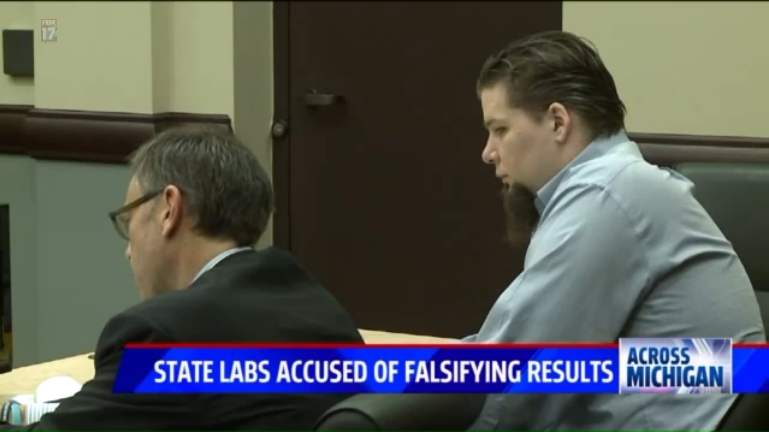
Lorincz lost custody of his 6-year-old son in part due to this felony.
After reporting on the case over nine months, FOX 17 exclusively reported a shocking email chain that spans months between Michigan State Police Forensic Science Division employees and the Attorney General’s office.
Obtained through the Freedom of Information Act, these emails show debates on how the state’s crime labs changed how they report marijuana. The defense, attorney Michael Komorn and Komorn Law, PLLC, is charging state agencies with directing the lab employees to falsely present results on marijuana products, including cases where plant material is not seen.
The result: felony charges Komorn argues are lies.

Komorn showed evidence in emails that MSP Forensic Science Division is being directed by the Attorney General’s office and the Prosecuting Attorneys Association of Michigan (PAAM) to change the way marijuana is reported to create felonies. PAAM is a non-profit, which is governed by a board of directors including the Attorney General.
“What is unique about this case is that they [the prosecution] are relying on the lab to report these substances so that they can escalate these crimes from misdemeanors to felonies,” said Komorn.
Documents obtained via FOIA, showcase emails about meetings (for instance, July 2013) and direct communication between MSP Forensic Science Division directors, scientists, PAAM, as well as officials with the AG’s office.
An excerpt from an email dated Dec. 13, 2013 suggests an AG official influenced the state crime labs on whether it is the lab’s responsibility to determine if THC tested is natural or synthetic; again, this is the difference between a misdemeanor and a felony.
A technical leader of controlled substances with MSP crime labs wrote an email to colleagues and quoted Ken Stecker, an official with the AG’s office:

“That is my opinion, THC is a schedule 1 drug regardless of where it comes from. I hope that helps. Ken”
Then, the technical leader of controlled substances at a state lab continues to direct other state lab personnel and write:
“Examiner’s that are identifying food products or other non-plant materials as marihuana without the visualization of any plant material should discontinue this practice. The final identification of all phases of testing can only be marihuana when plant fragments, portions, samples, plant hairs or actual plants are visualized by the scientist. To my knowledge, the only other two laboratories that have expressed this concern are Northville and Lansing.”
Komorn believes this policy change is not science-based.
“This is like a political decision, and somewhere in there they say well Ken Stecker is going to be the consultant on this going forward, and his position is that THC is a schedule 1,” said Komorn.
“That’s not the law. That’s an incorrect, illegal misinterpretation of the law that he then decrees as the policy for the state lab.”
This AG official’s “opinion” was written into lab procedure. Several emails show other MSP lab supervisors and scientists vehemently oppose it.
For example, a MSP Lansing controlled substances supervisor wrote his disagreements with this policy to colleagues, including an excerpt from an email dated Feb. 14, 2014:
“Prosecutor’s rely on our reports to determine what to charge a person with. A report that states delta-1-THC without any other statement would lead a Prosecutor to the synthetic portion of the law since this is the only place where THC is specifically listed. This could lead to the wrong charge of possession of synthetic THC and the ultimate wrongful conviction of an individual. For the laboratory to contribute to this possible miscarriage of justice would be a huge black eye for the Division and the Department.”
This supervisor wrote further concerns in an email to many colleagues nearly one year later, dated Jan. 28, 2015, writing in part:
“Upon reading this correspondence I immediately thought about the Guiding Principles training we receive yearly. Under Professionalism it states that “Conclusions are based on the evidence and reference material relevant to the evidence, not on extraneous information, political pressure, or other outside influences.” Whether or not an individual has a medical marijuana card is immaterial to how we report out our results.
When we made the previous changes I made it very apparent that I did not agree with it. One of my concerns was that by reporting out THC instead of marihuana it would lead to Prosecutors charging people with synthetic THC. This appears to be what the agency wants.”
Another MSP Northville lab scientist wrote the following to colleagues, stating concerns with new reporting policy:
“In order to place the actual compound THC in schedule 1, the criteria of ‘synthetic equivalent’ should be met. Since we really can’t do this, there are many of us who feel that these new evidentiary materials containing THC without any botanical morphology characteristics (candy, butter, etc..) should be identified as resinous extracts of Marihuana.
If you are to call it ‘THC,’ at a minimum, a statement should be provided in the additional information stating that the ‘origin, whether naturally occurring or synthetic could not be determined.’ Also, by going out on that limb and calling it THC, you now jump from a misdemeanor to a felony charge.
We’re bringing this up because there seemed to be some concern about uniformity in making these calls. Further, it is highly doubtful that any of these Med. Mar. products we are seeing have THC that was synthesized. This would be completely impractical. We are more likely seeing naturally occurring THC extracted from the plant!”
“The most damning evidence is that their own forensic scientists, when they’re objecting to the way the lab is going to change their reporting policies, calls them out that they can’t do it based on forensic science, and yet they do it anyways,” said Komorn.
Thursday afternoon, the Prosecuting Attorneys Association of Michigan’s President Michael Wendling responded to FOX 17’s questions with the following statements:
“The Michigan State Police Forensic Science Division sets its own testing and reporting protocols. Neither PAAM nor county prosecutors make those protocols.”
“The MSP Forensic Science Division makes its own decisions relative to the lab protocol. Any decision to report that the source of THC is undetermined does not create a misdemeanor or felony offense. Lab reports document the findings of scientific testing. Those findings, in conjunction with other relevant evidence are considered by prosecutors may be used in when the decision whether to charge a crime and which crime to charge is made.”
“Prosecutors do not receive requests to charge criminal cases from the MSP Forensic Science Division. The MSP Forensic Division reports scientific findings. Prosecutors receive those reports and use them to make decisions regarding whether there is sufficient evidence to pursue criminal charges. Any accusation that the Lab and PAAM are directing lab personnel to report crimes without evidence is untrue. PAAM has no authority over, nor does it direct the MSP Forensic Science Division.”

Yet again in this case, several lab scientists and supervisors expressed they are against this new marijuana reporting protocol.
As FOX 17 reported, the defense filed several motions in Ottawa County Circuit Court this week. The motions ask for Max Lorincz’s charges to be dismissed, as well as asking the accused organizations’ employees to show cause, or credible evidence to show science backs their protocol, in order to not be held in contempt of court.
The evidentiary hearing is set for Nov. 5.
FOX 17 also reached out to the Attorney General’s office for comment, but has yet to hear back. Michigan State Police public affairs personnel released comment to FOX17 Wednesday.
Watch The Report

Aug 30, 2015 | Blog, Criminal Defense Attorney Michael Komorn, Medical Marijuana Attorney Michael Komorn, Michigan Medical Marijuana Act, Michigan Medical Marijuana Criminal Defense Attorney Michael Komorn, News
“Allowing medical marijuana for those with autism was supposed to be the clinical trial,” Komorn said. “Instead, we’re going to have criminal trials.”
Lawyer slams decision to deny cannabis to autistic kids
The Detroit News Article
August 28, 2015 – Lansing — Michigan’s regulatory director on Thursday rejected the use of medical marijuana for the treatment of children with severe autism.
Michigan was poised to possibly become the first state to allow medical cannabis consumption for children with severe autism when the state’s Medical Marijuana Review Panel voted 4-2 earlier this month to recommend autism as a condition that qualifies for the drug.
Mike Zimmer, director of the Michigan Department of Licensing and Regulatory Affairs, said he rejected the request because of the lack of medical evidence showing marijuana helps with treating autism. He cited the opposition from the state’s chief medical examiner, Dr. Eden Wells.
“This lack of scientific evidence is more concerning when considering the broad scope of the petition, which does not limit medical marijuana treatment to overly severe cases of autism,” Zimmer said in his four-page letter.
Michael Komorn, a lawyer who filed the petition on behalf of a mother in southeast Michigan, called the decision disappointing and misguided. He said he’s considering seeking judicial review of the decision in Ingham County Circuit Court, where a judge’s prior ruling led to the review panel decision.
“He calls out the 55 parents and calls them all criminals. How dare you?” Komorn said of the impact of Zimmer’s decision on families seeking legalization of marijuana for autism treatment. “These parents are all in because their children are sick.”
Komorn said Zimmer’s concerns about a lack of controlled trials “is the red herring we’ve been fighting for a long time.”
Parents, he said, “are coming forward with anecdotal evidence” their children are being helped. The proper starting point for a clinical trial would be allowing them to continue, Komorn said.
Dr. David Crocker, a Kalamazoo physician who recommends cannabis use for patients with chronic pain, serves on the state’s medical marijuana board and questions its purpose if Zimmer can overrule Michigan’s marijuana “experts.”
“If you’re going to assemble a panel of experts for the purposes of determining this, why wouldn’t you go with their recommendation?” Crocker said. “I thought that our advice would be heeded in this case.”
But Lt. Gov. Brian Calley, who has a daughter with autism, supported the decision.
“While I fully support finding new treatment options, there are neither sufficient studies nor scientific trials demonstrating its clinical impact to justify approval at this time,” Calley said in a statement.
Paul Welday, head of a marijuana advocacy group seeking reforms of Michigan’s medical marijuana law, said Zimmer’s decision “has met with universal disdain by virtually everyone who has been watching this issue.”
Welday said his organization, the Michigan Responsibility Council, “will be talking with our attorneys/drafters to include both autism and Parkinson’s as eligible conditions” for medical marijuana in reforms it is proposing lawmakers adopt this fall. The organization wants to work with lawmakers on pending legislation that also would set up a regulatory regime governing medical marijuana policies.”
State law doesn’t appear to allow the use of marijuana oil or juice — two methods that advocates described as ways children could take medical marijuana, Zimmer said.
He also worried that allowing autistic children to use medical marijuana could cause an explosion of use with unknown health consequences, considering the prevalence of autism in Michigan.
The director added that autistic children who experience seizures because of their condition may already be eligible to use medical marijuana as a treatment under state law.
Supporters argued oil extracted from marijuana and swallowed has been effective in controlling extreme physical behavior by kids with severe autism.
But Michigan’s 2008 voter-initiated law did not explicitly legalize oil-based cannabis products. Supporters of marijuana for children with autism said the drug could be ingested orally instead.
“The reality is there are other ways of ingesting it besides the oil form that can be just as effective,” Crocker said. “I don’t think that the fact the oils are illegal should preclude autism from being a qualifying condition.”
The panel that initially approved the use of marijuana for autistic children was influenced by comments from some Detroit-area doctors, especially the head of pediatric neurology at Children’s Hospital of Michigan, and from parents desperate for relief.
The state panel in 2012 and 2014 rejected allowing medical marijuana for autism. It led to a court battle and a challenge by Attorney General Bill Schuette before the panel accepted the latest formal request in the spring.
Article by
Gary Heinlein and Chad Livengood, Detroit News Lansing Bureau August 28, 2015

Aug 1, 2015 | Health Benefits of Marijuana, Medical Marijuana, Medical Marijuana Attorney Michael Komorn, Michigan Medical Marijuana Act, Michigan Medical Marijuana Association, News
Michael Komorn, a Michigan attorney who specializes in medical marijuana laws and is also the president of the Michigan Medical Marijuana Association, who filed a petition on behalf of a mother in southeastern Michigan, said no other state allows medical marijuana for severe autism.
This inspired several posts including MLive and the Washington Times. The post stated Michigan would become the first state to allow medical marijuana for children with severe autism if a senior official follows the recommendation made Friday by an advisory panel.
The state’s Medical Marijuana Review Panel voted 4-2 to recommend autism as a condition that qualifies for the drug.
Supporters say the extracted oil from marijuana when swallowed has been effective in controlling extreme physical behavior by kids with severe autism. It wouldn’t be smoked.
The panel was influenced by comments from some Detroit-area doctors, especially the head of pediatric neurology at Children’s Hospital of Michigan, and parents desperate for relief.
Now the recommendation go before Mike Zimmer, who is the director of the Department of Licensing and Regulatory Affairs. He has until late October to make a final decision.
Voting in favor of allowing it, Dr. David Crocker, a panel member noted that two doctors need to give their approval for a child to get a medical marijuana card from the state.
“We have a pretty good checks-and-balances system,” he said.
Michigan’s chief medical executive, Dr. Eden Wells, serves on the panel and voted no. She’s not convinced that there’s enough research on the topic, especially the long-term effects of marijuana on children.
The same panel rejected an autism petition in 2013 in what had been called a final decision. Smith’s petition was initially denied by LARA, but she successfully sued to force reconsideration.
The review panel voted 4-2 in favor of a petition submitted by Lisa Smith, a Michigan mother who has said cannabis oil has helped improve her severely autistic 6-year-old son’s behavior, sleep patterns and eating schedule.
Attorney Michael Komorn, who represents Smith, said her petition included hundreds of pages of research on autism and medical marijuana that was not included in the 2013 debate.
Smith’s son was certified to use medical marijuana because he also has epilepsy, which is already a treatable medical condition under the law.
“Otherwise, she would not have been able to get a recommendation from her doctor to see the benefits that it had on autism,” Komorn said. “She’s heroic in that she came forward and was able to tell her story so that this could happen.”
“These things are things we do not know until we have enough experience with these medications in a controlled trial. … I don’t think we have those checks and balances,” Wells said.
Experts writing in the February edition of the Journal of Developmental & Behavioral Pediatrics cautioned that marijuana for kids with severe autism might serve only as a “last-line therapy.”
Only one condition, post-traumatic stress disorder, has been added to those that qualify since Michigan voters approved marijuana for the side effects of cancer and a few other illnesses in 2008.






